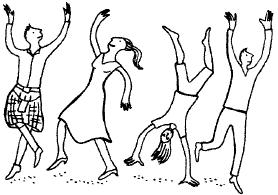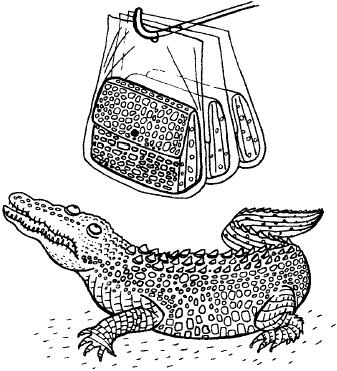
those who have butter on their head should not run around under the sun
Whatever kind of character we’ve been blessed with, we all still experience similar highs and lows of emotion. Pure happiness is a wonderful thing; and we should never take it for granted, for who knows how long it may last?
kusamba (Ngangela, Angola) to skip, gambol, express uninhibited joy
sungumuka (Luvale, Zambia) to experience transitory pleasure in the novel
faly ambonindoza (Malagasy, Madagascar) delight before the danger is passed, premature joy

choi lu bù (Vietnamese) to have round after round of fun
alegria secreta candela muerta (Spanish proverb) unshared joy is an unlighted candle
The opposite emotion is rarely sought, but it arrives all the same:
at være i kulkælderen (Danish) to be very sad or depressed (literally, to be in the coal cellar)
lalew (Manobo, Philippines) to grieve over something to the extent that one doesn’t eat
dastehen wie ein begossener Pudel (German) to look depressed (literally, to stand there like a soaked poodle)
mal ikke fanden på veggen (Norwegian) to be very pessimistic (literally, to paint the devil on the wall)
dar lástima (Latin American Spanish) to be in such a bad way that people feel sorry for you
bang(Dutch) afraid
blag(Haitian Creole) joke
puke(Rotuman, South Pacific) to come strongly over one (of feelings)
drift (Dutch) passion
job (Mongolian) correct, good
meal (Gaelic) to enjoy
Sometimes the best course is just to let it all hang out:
kutar-atugutata (Yamana, Chile) to get hoarse from much crying
gegemena (Rukwangali, Namibia) to mutter while sobbing
sekgamatha (Setswana, Botswana) the dirtiness of the face and eyes from much crying
dusi (Malay) to be perpetually crying (of young children)
āpaddharm (Hindi) a conduct permissible only in times of extreme distress
Though even tears are never as straightforward as we might like them to be:
ilonkyynelet (Finnish) tears of joy
miangòtingòtim-bòninàhitra (Malagasy, Madagascar) to weep in order to get something
chantepleurer (French) to sing and weep simultaneously
‘Cheer up!’ we tell each other. And hopefully this brings the right results:
elmosolyodik (Hungarian) to break into a smile
sogo o kuzusu (Japanese) to smile with delight (literally, to demolish one’s face)
cuòi khì (Vietnamese) to laugh a silly laugh
The idioms of the world are full of colour. But in Germany ‘blue’ has a rich range of uses:
blaue vom Himmel herunter lügen to lie constantly (literally, to lie the blue out of the sky)
grün und blau ärgern sich to see red (literally, to anger oneself green and blue)
blau machen to take a day off (literally, to make blue)
blau sein to be drunk (literally, to be blue)
mit einem blauen Auge davon kommen to get off unscathed (literally, to get away with a blue eye)
ein blaues Auge a black eye (literally, a blue eye)
die blaue Stunde the time before dusk especially during winter (literally, the blue hour)
Sometimes, indeed, more than the right results:
bungisngís (Tagalog, Philippines) one who giggles at the slightest provocation
ngisngis (Manobo, Philippines) someone who cannot control his laughter
latterkrampe (Norwegian) convulsive laughter
mengare (Gilbertese, Oceania) a forced laugh, to laugh on the wrong side of one’s mouth
tirebouchonnant (French) extremely funny (literally, like a corkscrew – as one takes in air repeatedly to laugh)
mémêstátamaò’o (Cheyenne, USA) to laugh so hard that you fart
In the Arab world they distinguish between those who are good humoured, damak khafeef, literally, their blood is light, and the opposite, damak tieel, their blood is heavy. But however well meaning, humour always carries the risk of failure:
pikun (Kapampangan, Philippines) one who cannot take a joke
nye kartoshka (Russian) no joking matter (literally, no potato)
jayus (Indonesian) someone who tries to make a joke which is so unfunny that you laugh anyway
The different expressions for ‘pulling someone’s leg’ reveal subtle differences in approaches to teasing. For the Germans it’s jemandem einen Bären aufbinden. literally, to sell somebody a bear; for the French it’s mettre en boite, to put someone in a box. The Spanish pull your hair (tomar el pelo), the Finns pull your nose (vetää nenästä), while the Czechs go one further and hang balls on your nose (věšet bulíky na nos).
But better, surely, to laugh at your troubles than live on your nerves:
bēi gōng shé yǐng (Chinese) worrying about things that aren’t there (literally, seeing the reflection of a bow in a cup and thinking it’s a snake)
qaquablaabnaqtuq (Iñupiat, Inuit) to be tense because of an impending unpleasantness
doki doki (Japanese) the feeling of great anxiety when someone is about to do or doing something very nerve-racking
hira hira (Japanese) the feeling you get when you walk into a dark and decrepit old house in the middle of the night
como cocodrilo en fabrica de carteras (Puerto Rican Spanish) to be extremely nervous (literally, to be like a crocodile in a wallet factory)

We all aspire to zanshin (Japanese), a state of relaxed mental alertness in the face of danger; but for most of us our reactions are all too human when bad things really do happen:
les avoir à zéro (French) to be frightened (literally, to have one’s testicles down to zero)
ngua mat (Vietnamese) unable to stand something shocking
khankhanana (Tsonga, South Africa) to fall backwards rigid (as in a fit or from extreme fright)
jera (Indonesian) so scared by a past experience that one will never want to do it again
Then again, rather be healthily scared than driven round the bend:
keçileri kaçırma (Turkish) to lose one’s marbles (literally, to kidnap the goats)
avoir une araignée au plafond (French) to be crazy (literally, to have a spider on the ceiling)
lud ko struja (Serbian) crazy as electricity
más loco que un plumero (Spanish) crazier than a feather duster
vrane su mu popile mozak (Croatian) he’s crazy (literally, cows have drunk his brain)
šplouchá mu na maják (Czech) it’s splashing on his lighthouse
hij heeft een klap van de molen gehad (Dutch) he got a blow from the windmill
ne pas avoir inventé le fil à couper le beurre (French) not to have invented the cheese wire to cut butter
hu khay beseret (Hebrew) he lives in a movie; his whole life is like a movie
non avere tutti i venerdì (Italian) to be lacking some Fridays
tem macaquinhos no sotão (Portuguese) he has little monkeys in the attic
udaren mokrom čarapom (Serbian) hit with a wet sock
ikke at vsere den skarpeste kniv i skuffen (Danish) not to be the sharpest knife in the drawer